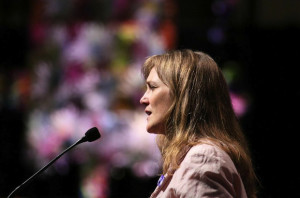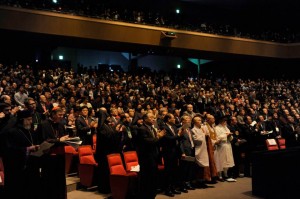Mission from the Margins


3000 participants representing 345 member churches of the World Council of Churches gathered for the opening plenary of the WCC 10th Assembly. ©Joanna Lindén-Montes/WCC
- A poignant, persistent call to work for and believe in the possibility of just peace in Israel and Palestine and plan the next WCC assembly for Jerusalem
- Strong, collaborative work among Indigenous peoples before and at the assembly to engage the WCC and its churches in promoting Indigenous rights, fostering self-determination, and building a future of right relations.
- The cry of Pacific peoples, facing rising water around their island communities, reflected in a strong statement for action against climate change.
- Dalits, Indigenous peoples, anti-racism networks and persons with disabilities working together, compelling churches to become just and inclusive communities.
- Communities from the Korean Peninsula, DRC and South Sudan sharing an imperative of peace from their conflict-weary lands.
The World Council of Churches Assembly “business sessions” are like many other church meetings. While they run on consensus rather of Robert’s rules of order, they are business nonetheless. And yet, within what can seem dry, almost technical conversations, the impulse towards spirited justice —the global church as movement— continues to break through. Sometimes it comes in a voice from the floor whose urgency reveals the pain of a community and its struggles. And while they risk being ruled “out of order,” the speaker’s passion has already stirred the whole gathered assembly. Sometimes you can see it in the acceptance of a resolution or a statement on a priority justice issue which, although seemingly clear and consensual, is the result of much behind-the-scenes work by those most affected by the issue, the result of passionate mind-changing discussion. Outside of the room, in plenaries and in workshops, over coffee and at displays, face-to-face interactions change hearts in ways that urge the assembly business, the agenda of the global church, towards a stronger justice. The voices of those most affected—those on the front lines of struggle—break through and, while not enough, the church is changed, the gathered community is changed.
Mission has been traditionally understood to flow from the centre to the periphery, from the privileged to the marginalized of society. The Truth and Reconciliation process in Canada has shown us how this can become warped and distorted. The Assembly was the occasion to launch a contrasting, renewed view of mission in the statement Together Towards Life: Mission and Evangelism in Changing Landscapes. Here mission is turned upside down and inside out: “We affirm that marginalized people are agents of mission and exercise a prophetic role which emphasizes that fullness of life is for all… Justice, solidarity and inclusivity are key expressions of mission from the margins.” It is a profound theological shift—not mission to the margins, or even mission at the margins, but mission from the margins. It was my experience last week that in imperfect but very real ways, the global church was moving towards this changed mission, endeavouring to be evangelized, to be transformed, by those made marginal, those most deeply affected by struggles. The church was striving to recognize and affirm the Spirit of God testifying in social and ecological justice movements, striving to be a worthy recipient of the mission of God.
I leave deeply grateful for the opportunity to be changed, to be inspired, to be challenged. I believe that my own sense of mission has been deepened and transformed. As I conclude this experience, I want to express my deep gratitude to many people — the staff of the WCC for organizing the assembly and for facilitating my attendance, my Canadian colleagues for their companionship and collaboration, our global partners and the opportunities to work and meet together face-to-face, the emerging global Indigenous network and the privilege of accompaniment, new friends and colleagues in the ecumenical movement and my work community and family here in Canada who made the space for me to attend. I return to our shared work inspired and thankful, having experienced God’s mission in many very tangible ways. May the Spirit of God move restlessly through our movements for justice, giving voice to our lament, challenging our deeper solidarity, and connecting us in companionship until God’s very dream is realized here on earth. Amen
This is Jennifer’s final blog from Busan. Key outcomes, statements, and addresses from the Assembly are available on the Assembly website.
